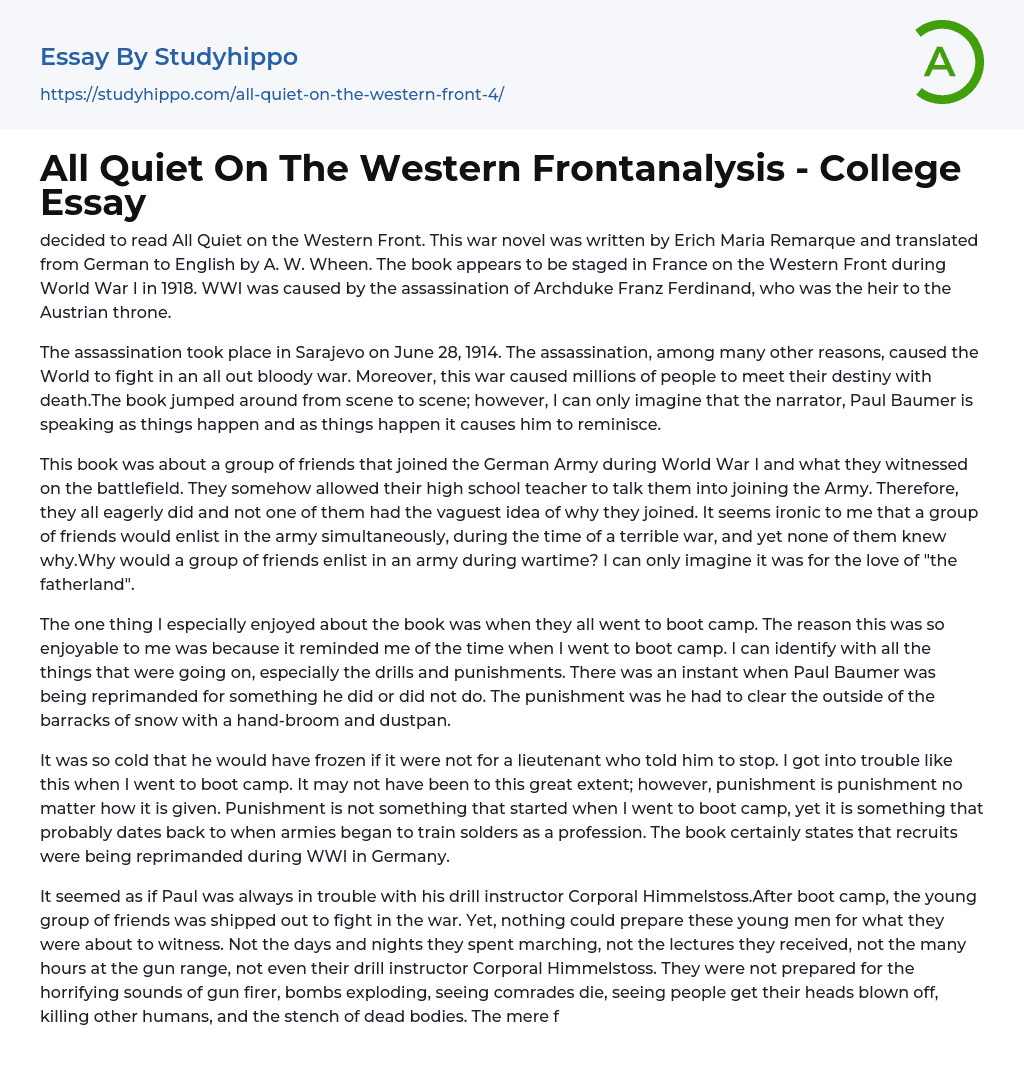By selecting to peruse All Quiet on the Western Front, penned by Erich Maria Remarque and later translated into English by A. W. Wheen, I was taken to France's Western Front in 1918 during World War I - a conflict that arose after Archduke Franz Ferdinand, the heir apparent to Austria's throne, was assassinated.
Despite not presenting them in chronological order, Paul Baumer narrates and reflects on the occurrences that ultimately led to a catastrophic worldwide war resulting in the loss of millions of lives. One such event was the assassination in Sarajevo on June 28, 1914.
The book delves into the accounts of a circle of companions who enlisted in the German Army during World War I, despite lacking a clear motivation. Their high school instructor persuaded them to enlist and they all felt a strong affection for their "fatherland." The irony is that they eagerly
...joined forces during wartime without a distinct purpose.
The book's boot camp scenes were particularly enjoyable because they reminded me of my own experience. I could relate to the drills and punishments, such as when Paul Baumer was reprimanded for a mistake and had to clear snow with a hand-broom and dustpan outside the barracks.
Despite the intensity of the cold, a lieutenant's intervention prevented freezing. Drawing on personal experience from boot camp, punishment is recognized as an inherent feature in soldier training. This discipline dates back to the earliest professional armies and is documented in WWI-era Germany, as per the book's record of reprimands dealt to recruits.
Paul constantly found himself in trouble with his drill instructor Corporal Himmelstoss. Despite being put through boot camp, receiving lectures and spending hours at
the gun range, nothing could have prepared the young men for the horrors of war. The sounds of gunfire and bombs exploding, witnessing the deaths of comrades and people having their heads blown off, killing other humans and the stench of dead bodies were unimaginable. The mere fact of witnessing those close to him dying took a toll on Paul and his friends.
Describing the events that occurred on the battlefield, Paul recounts how he unintentionally stabbed a man to death when the man stumbled into his shell hole. The narrative suggests that Paul had become habituated to killing to the extent that it had become a reflexive action.
The Western front witnessed a bloody war that left Germany with only a few miles of gain after their initial attack, shattering the soldiers' spirit. The loss incurred by Germany was not limited to just shattered morale, but also relinquishing land and citizens at the end of WWI, which ranks as one of the most catastrophic wars in the twentieth century. Paul Baumer shares his first-hand experience of the atrocities of war in this book, which includes witnessing gruesome deaths and hearing heart-wrenching sounds that could move a person to tears. It is evident that the loss of loved ones had a profound impact on Paul.
Recognizing that he could no longer operate within society, he understood that he needed to resist. He was the sole survivor among his group of friends, as six of them had perished. He joined them in death in October of 1918, only two years following his graduation from school.
Paul was merely 20 years old.
- Air Force essays
- Army essays
- Soldiers essays
- Army Values essays
- United States Army essays
- Veteran essays
- Aircraft essays
- Sergeant essays
- League Of Nations essays
- Battle Of The Somme essays
- Treaty Of Versailles essays
- 1984 essays
- A Farewell to Arms essays
- A Good Man Is Hard to Find essays
- A Hanging essays
- A Lesson Before Dying essays
- A Long Way Gone essays
- A Rose For Emily essays
- A Separate Peace essays
- A Tale Of Two Cities essays
- A Very Old Man With Enormous Wings essays
- Adventures Of Huckleberry Finn essays
- Alice in Wonderland essays
- All Quiet on The Western Front essays
- Allegory of the Cave essays
- An occurrence at owl creek bridge essays
- Animal Farm essays
- Anthem essays
- Antigone essays
- Arthur Conan Doyle essays
- As I Lay Dying essays
- Atticus Finch essays
- Barn Burning essays
- Battle Royal essays
- Beauty and The Beast essays
- Beloved essays
- Boo Radley essays
- Brave New World essays
- Candide essays
- Castle essays
- Characters In Hamlet essays
- Characters In Romeo And Juliet essays
- Christmas carol essays
- Chronicle of a Death Foretold essays
- Cinderella essays
- Crime and Punishment essays
- Daisy Miller essays
- Death of a Salesman American Dream essays
- Desdemona essays
- Diary Of A Wimpy Kid essays




